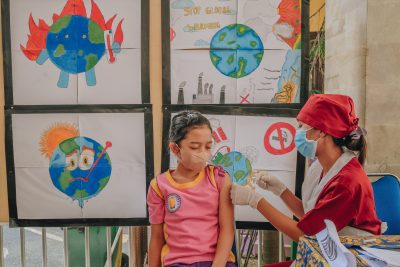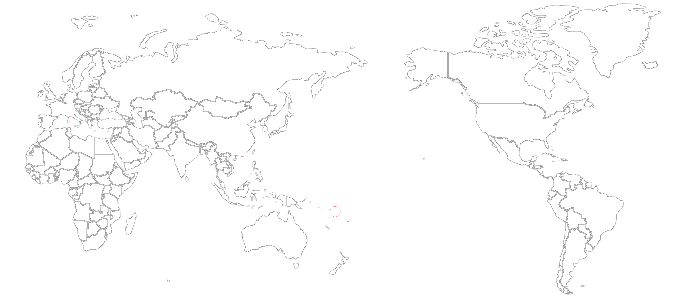Author: Siwage Dharma Negara, ISEAS Yusof Ishak Institute
2021 has been another challenging year for Indonesia as it struggles to balance the economy and public health amid the COVID-19 pandemic. While the economy seems to have passed the worst of the crisis, its future trajectory remains unclear.![]()

At the beginning of the year, there was optimism that Indonesia would rebound to 5 per cent growth this year, after its economy shrank by 2 per cent year-on-year in 2020. The Delta variant turned many predictions upside down as Indonesia saw a significant jump in daily infections, reaching more than 56,000 cases in July last year. At that time, the country took over India as the new pandemic epicentre. Between July and August, nearly 75,000 COVID-19 deaths were recorded, but the actual number is likely much higher given limited testing and poor reporting.
Prior to that, the government eased mobility restrictions and even encouraged civil servants to work from Bali to help the tourist island’s economy. The surge in cases derailed Jakarta’s plans for a ‘new normal’ as the government has arguably applied its most austere anti-pandemic policies since. The government boosted vaccination programs and tightened mobility restrictions in July. This reduced the number of daily infections significantly. By September, daily confirmed cases dropped by 94.5 per cent compared to the country’s peak.
Indonesia should now prepare for new variants like Omicron. An unexpected public health crisis similar to that in July might return, given the surge of novel variants and the country’s limited health system. Yet, vested interests have increased uncertainty in the government’s handling of the pandemic and jeopardised efforts to contain the virus. For example, high-level policymakers’ involvement in the PCR test business led to irrational policy decisions. Likewise, the flip-flopping on mobility and activity restrictions during the holiday season indicates the presence of political-economic interests.
On 14 October, the government decided to re-open Bali for international visitors. Tourism to the island is vital for plans to invite more foreign investors and host the G20 summit in 2022. Indonesia intends to use the global event to showcase its ability to control the pandemic and contribute to the international agendas on pandemic recovery, climate change and digitalisation. It remains to be seen if foreign tourists and investors will return to pre-pandemic numbers as Indonesia works to vaccinate its 275 million residents.
Then there’s the constitutional court’s decision that the government unconstitutionally passed the controversial Job Creation Law. The law, passed in October last year, is marketed as a game-changer that will streamline and consolidate dozens of laws to improve the ease of doing business.
President Joko Widodo has been concerned about Indonesia’s declining attractiveness for investors. He rightly envisioned the need to cut red tape. But implementing this law in a democratic system proved challenging. The court argued the law-making process was flawed and gave the government two years to revise it, or the law and its derivative regulations would be permanently repealed.
Such drama showcases the chronic regulation uncertainties investors and business people face in Indonesia. The revision process is likely to create new controversy and will, in turn, make it even more challenging for the government to attract foreign investment. Indeed, investment growth this year has not returned to its pre-pandemic level. Household consumption, the largest component of GDP, also remains weak, despite massive fiscal stimulus to the equivalent of some US$51.7 billion.
Why did the stimulus have little impact? Budget execution is stubbornly slow and may not reach the correct targets. In 2020, the central government spent just 82.8 per cent of its economic stimulus funds. As of December 2021, the realised funds disbursement only reached 68.6 per cent of the total allocation. Local governments faced similar disbursement problems. As of November, 35 per cent of the total budget allocation to the local government, amounting to US$44.58 billion, remains unspent, despite a stern warning from President Widodo.
This problem occurs almost every year, even before the COVID-19 pandemic. It is typical for districts to build up their bank balances during the fiscal year and then spend a large share — up to one-third — in the last two months. During the pandemic, spending is further hampered by the sudden changes in the budget plan due to the uncertain pandemic situation and the impact of social mobility restrictions.
Minister of Finance Sri Mulyani Indrawati has said the slow use of the local budget by regional governments was often triggered by structural problems, such as complex procedures and tighter governance requirements introduced to avoid improper disbursements. She said the government is currently reviewing local government spending and would find a way to simplify the procedure, including the central government taking over some spending.
The slow budget disbursement has meant that on the one hand, the budget deficit is smaller than expected — which is good because the administration targeted a return to a deficit of three per cent of GDP by 2023. But on the other hand, overall aggregate demand remains weak. Inflation remains low, indicating weak consumer demand. Credit growth remains sluggish, at around 3–4 per cent — half of Jakarta’s target.
With less than two-thirds of his final five-year term left, Jokowi will be judged on how Indonesia recovers from COVID-19. So far, the pandemic has not put as much pressure on the country’s exchange rates and foreign-exchange reserves. Higher commodity prices also provide some ‘windfall’ revenue for its tight fiscal space.
Going forward, Indonesia needs to watch out for its mass cash handout programs and central-bank bond-buying policy. It should prepare to unwind these unconventional budgetary and monetary policies amid changing global financial conditions.
Siwage Dharma Negara is the Co-Coordinator for the Indonesia Studies Programme and Coordinator for the Singapore APEC Study Centre at the ISEAS Yusof Ishak Institute.
This article is part of an EAF special feature series on 2021 in review and the year ahead.
East Asia Forum welcomes comments, both for adding depth to analysis and for bringing up important new issues. Original comments adding insight and contributing to analysis are especially encouraged.
The editors retain the right to refuse and edit comments at any time.
Your email address will not be published. Required fields are marked *
*
*
document.getElementById( “ak_js_1” ).setAttribute( “value”, ( new Date() ).getTime() );
This site uses Akismet to reduce spam. Learn how your comment data is processed.![]()
